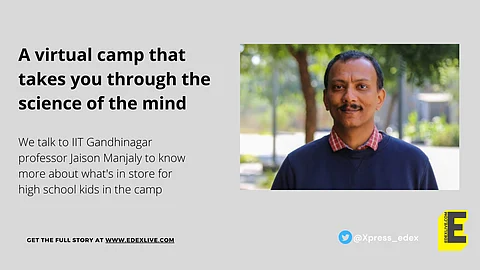

While in school, students are often only concerned with what's in their textbooks and syllabi for the exams. Ideally, we all know that school's purpose is to enable learning and an unquenchable zeal to know more. But schools in themselves can only do so much. Outside interventions are greatly needed especially to let children know what awaits them once school's over and real life begins. Extending a helping hand to school students to know about subjects taught in college, is the Indian Institute of Technology, Gandhinagar. Banking on the success of their pilot camp in humanities and social sciences for students of class VIII to XII, they are now coming up with another virtual camp that would delve into the field of cognitive science. We talked to the camp coordinator and Jasubhai Memorial Chair Professor, Jaison A Manjaly to know more about this initiative and how it would aid students who are new to the discipline. Excerpts:
How did you first hit upon the idea of conducting a camp for school students?
We had conducted the Camp in Humanities and Social Sciences in the month of July. I feel like, in India, the higher education institutions do not really reach out and engage with school children. But in top universities abroad, they have a deep connection with schools and students. Students there are aware of what goes on in universities and are updated on the possibilities waiting for them when they finish schooling. So we wanted to replicate that in India where we can have a more proactive engagement with school children. We thought to ourselves, can we make an impact on their thinking process, can we enable them with more critical thinking by introducing more domains of knowledge to them. Also, we simply aim to make learning fun for them.
So coming to the camp itself, what would it entail for the students? What would be the learning outcome for them?
The field of cognitive science is a new and emerging academic field in India. It is gaining in popularity but many people still do not know about it. It is good that the IITs have picked up on it, with IIT Gandhinagar being the first to introduce a programme in this area. Through this camp, we want to introduce terms like artificial intelligence and neuroscience which are integrated in the discipline of cognitive science to know about how the brain functions and topics like the philosophical understandings of the mind. We also want to create the understanding that in an area like cognitive science, disciplinary boundaries are not relevant because of its interdisciplinarity.
How would the camp build on the syllabus of schools that children study in school?
We are not going to teach them like subjects are taught at schools. Instead, a new domain and its topics will be introduced to them in an interactive way. I feel that a camp is an informal space where people interact, share experiences and knowledge and create communities. We would like to enable children to learn about cognitive science in their own way. The idea is to trigger their curiosity.
Since the camp is open for teachers and parents as well, what do you expect their role to be?
The camp opens up the possibility of learning a lot of things for the children. Sometimes when they learn a lot, parents and teachers often do not cope with that pace. They also need to stay updated because they are the ones who influence the children ultimately.
Why did you choose the online mode for the camp? How will it drive the learning process?
Of course, one reason is that the effects of the pandemic are still at large. Creating a camp in the physical mode would mean that a lot of students across the country would miss out on the opportunity. A physical camp would mean that students would have to travel with their parents and that's not feasible for a majority. Another major reason is that students are now familiar with the online mode of learning. So I can take advantage of this to create the ideal experience for them. We are also planning to give the participants a complete virtual tour of the curiosity lab at IIT Gandhinagar, which is conducting the camp, so that they know how experiments are conducted. I am sure that this part will be very exciting for them.
What were some of the surprising outcomes that you observed during the last camp? What do you expect from students this time?
I found that students were very excited and they wanted more such camps to be conducted. For all the sessions we conducted, we took ratings to know their response. Not even one session was rated anything below excellent. The surprising result was that many of them did not even know about IITs having a humanities and social science curriculum.
How do you see the evolution of disciplines like cognitive sciences in IITs? Can we expect undergraduate programmes in them as well?
We expect to move towards a future where the IITs can evolve into a university-like institution where there are undergraduate programmes available not just for the sciences but the humanities and social sciences as well. We see premier institutes like MIT in the west already taking such initiatives. Only then would we have an environment where new ideas and innovations would emerge.
